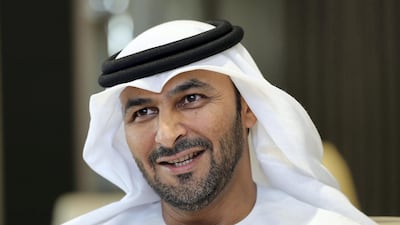Abu Dhabi National Oil Company's logistics and services arm is assessing research and development opportunities with global players to further improve ways to transport hydrogen amid growing interest in the clean fuel.
The move follows an earlier pledge by Adnoc Group to develop blue hydrogen for export after it joined an alliance with other Abu Dhabi entities including holding company ADQ and Mubadala Investment Company. Blue hydrogen refers to the fuel produced from natural gas.
"We are looking at studying with Adnoc HQ but also with other global players on how we can develop R&D projects and see how these molecules will be transported," Captain Abdulkareem Al Masabi, chief executive of Adnoc Logistics and Services, told The National in an interview.
"There's many ways of transporting it. There's hydrogen but also ammonia. There's been big talk of ammonia but today in terms of shipping, logistics, there are no vessels that have actually used it in terms of fuel," he added.
Hydrogen development is high on the agenda of both the UAE and Saudi Arabia as they aim to decarbonise their economies.
McKinsey estimates that the development of a hydrogen economy could generate $140 billion in annual revenue by 2030 in the US alone. Middle East exporters of oil are looking to leverage existing customer relationships to trade in new forms of energy.
Last month, Saudi Arabia, the Arab world's biggest economy, agreed to ship natural gas to South Korea for the production of hydrogen in return for carbon dioxide. The CO2 gas will then be used in oil production facilities in the kingdom.
Saudi Aramco previously shipped blue hydrogen to Japan, one of its top importers. The shipment was in the form of the more easily transportable ammonia for use in zero-carbon power generation in the East Asian economy.
"This is something definitely that we are looking for as well in Adnoc," Capt Al Masabi said.
"In logistics and services, we are in touch with the likes of DNV GL and ADS, in order to see what is the best design of a transportation mode for hydrogen and for CO2 as well."
Adnoc Logistics and Services is in expansion mode, Capt Al Masabi said. The company is acquiring six large crude carriers (VLCCs), which will add a total cargo capacity of 12 million barrels.
Two VLCCs have already joined its fleet, with orders in process for three new-build vessels, which will be delivered in 2022 and 2023.
Four of the VLCCs will have the capability to run on liquefied natural gas, which Capt Al Masabi said will help reduce emissions by 30 to 40 per cent.
Adnoc Logistics and Services is also in the market to acquire companies or assets that will fit into its integrated services model for shipping and logistics.
Last month, the company acquired all UAE-based assets of the UK's Speedy Hire, a provider of tools and equipment for the energy and industrial sectors.
"This is the next game changer for us, not [just] focusing on how we acquire assets or vessels but looking at distribution from an end-to-end, that is our business model going forward [which] will always look at partnerships either through a joint venture or a merger and acquisition," Capt Al Masabi said.
In line with Adnoc Group's internal targets to lower emissions by 25 per cent over the next decade, the logistics and services company is planning to lower its carbon footprint.
"We are today basically on the path to achieve all these targets in advance before the International Maritime Organisation targets," said Capt Al Masabi.
The company became compliant with regulations mandated by the IMO to cap sulphur missions ahead of a 2020 deadline.


